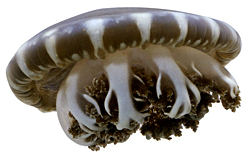DK Science: Animal Kingdom
Animals belong to the largest and most diverse of the five kingdoms of living things. So far over two million animal species have been identified. All animals share certain features. Unlike plants, animals get the energy they need by eating food. They are all made up of many cells and many animals are highly mobile. Most reproduce sexually and have sense organs that allow them to react quickly to their surroundings. CLASSIFICATION uses these and other characteristics to group similar animals together.
In order to make animals easier to study, scientists divide the animal kingdom into divisions and subdivisions. The first division is called a phylum. Each phylum breaks down into groups called classes. Classes are divided into orders, then families, and then genera. Each genus contains species, which are individual groups of animals that have the same characteristics and can breed together.

Some animals, such as jellyfish, have a relatively simple structure. They have no skeleton, few muscles, and their movement is uncoordinated – they drift with ocean currents. Jellyfish are referred to as invertebrates because, like 98 per cent of animals, they have no backbone.

Animals with backbones, like these zebras, are commonly referred to as vertebrates. Mammals, birds, fish, amphibians, and reptiles are all vertebrates. Zebras belong to the mammal order. Mammals, which also include humans, are the most complex animals in the animal kingdom.

Fossils indicate that animals have existed on Earth for over 1.2 billion years, but our knowledge of past life is still incomplete. Some prehistoric animals look very different from today’s animals. However, this ammonite looks similar to the living sea animal nautilus. We can learn about past life by studying the similarities between fossils and living animals.
Every animal species has a unique Latin name. The first word is the genus name, which is shared with closely related animals. The second word is the specific name, which, together with the genus, is unique to a particular species.
Animals are not classified by size. The giraffe and harvest mouse differ hugely in size but are both classified as mammals because they have fur, single-boned jaws, and suckle their young.
Animals are the only living things to have conquered the air. Insects, birds, and bats are all capable of powered flight. Birds have strong muscles to power their flight, coordinated by a well-developed brain and nervous system.
Animals can be very small. A mite is so small that it cannot be seen with the naked eye. Its size is limited because it can only grow by moulting (shedding its outer layer). Mites have a hard external skeleton and move on jointed legs. Other animals with these features include spiders and scorpions, many insects, and crabs.


